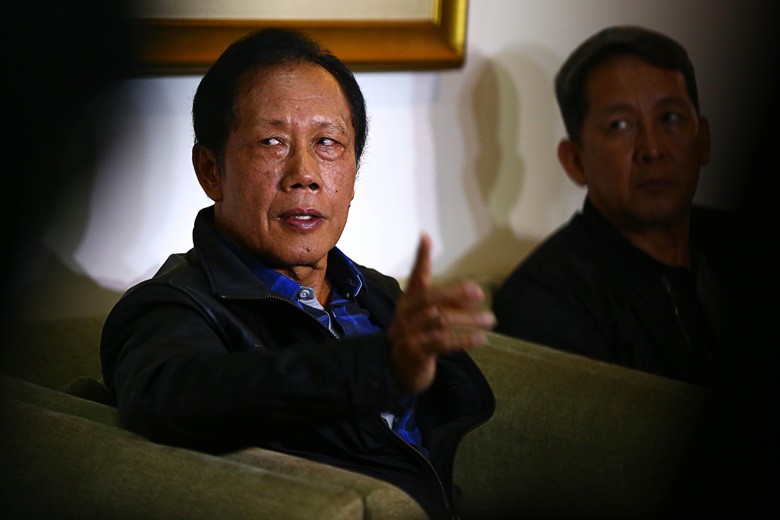BIN’s request for extra power deemed unnecessary, unlawful
Change Size
 Mission accomplished: National Intelligence Agency (BIN) chief Sutiyoso gives details on the surrender of the notorious Acehnese armed group leader Din Minimi during a press conference at Halim Perdanakusuma Airport in East Jakarta in December. Experts have said the agency’s request for extra power to summons and question terrorist suspects is unnecessary and unlawful as it may potentially trigger power abuse.
(thejakartapost.com/Wienda Parwitasari)
Mission accomplished: National Intelligence Agency (BIN) chief Sutiyoso gives details on the surrender of the notorious Acehnese armed group leader Din Minimi during a press conference at Halim Perdanakusuma Airport in East Jakarta in December. Experts have said the agency’s request for extra power to summons and question terrorist suspects is unnecessary and unlawful as it may potentially trigger power abuse.
(thejakartapost.com/Wienda Parwitasari)
E
xperts have said that the National Intelligence Agency's (BIN) request for extra power to summons and question terrorist suspects is unnecessary and unlawful as it may potentially trigger power abuse.
Human Rights Working Group (HRWG) executive director Rafendi Djamin said even though the spy agency was not given the power to arrest, summoning a terrorist suspect for interrogation would automatically include "forced arrest", especially when the person summoned refused to appear.
Such a power, Rafendi said, would inevitably violate prevailing laws because BIN was not a law enforcer and it did not have the power to pursue a suspect, including to carry out an interrogation, an authority belonging to the police by nature.
"Giving BIN an extra power to summons and question terrorist suspects will clearly violate civil rights as it may lead to an abuse of power by a state agency, which does not have an authority to summons suspects," Rafendi told thejakartapost.com
He further said a state could arrest its citizens by force; however, it could do so only if it had sufficient evidence to declare those individuals guilty of violating the Criminal Code (KUHP). Any agency with such a forced arrest power should also have a legal authority to perform the tasks.
Rafendi said giving BIN power to arrest and question would lead to overlapping authorities with other security agencies, particularly the police.
The 2011 State Intelligence Law stipulates that BIN should be able to work undercover in finding information on potential terrorist attacks without getting involved with the suspects themselves while at the same time they must cooperate with the National Police.
In the current 2003 Terrorism Law, information gathered by intelligence could only be used as preliminary evidence to detain suspects for one week. Before using the information, investigators should first get assurance from a district court that it was legal for them to use the finding.
Under the draft revision to the Terrorism Law, the police can use intelligence reports to make preemptive arrests. They also could start interrogation only based on reasonable suspicions that a group of suspects was discussing or planning terrorist attacks. It also stipulates that any court judges could make a decision to allow the police to make pre-emptive arrests and interrogation.
"Hence, why should BIN request extra powers [to summons and interrogate]? The draft revision has mandated that intelligence reports gathered covertly could become preliminary evidence, anyway," Setara Institute deputy chairman Bonar Tigor Naipospos said.
Bonar said the intelligence agency should stick to its main duties of collecting data and information covertly, gathering the facts from behind the scene.
Besides, the power of summoning might have the potential to trigger the abuse of civil liberties such as interrogation without being accompanied by lawyers or the use of torture during questioning, which violated human rights, Bonar added.
BIN chairman Sutiyoso demanded on Monday that House of Representatives Commission I overseeing defense and foreign affairs grant the intelligence body the power to summons and question terrorist suspects in order to gain more information.
Commission I chairman Mahfudz Siddiq said the request may be considered by the House during discussion of the draft revision in the near future, kompas.com reported.
However, Golkar lawmaker and Commission I member Bobby Adhityo Rizaldi said the lawmakers would likely reject the spy chief's request on extra powers as it was prone to abuse of power.
Commission I only wants BIN to be more involved in future counterterrorism efforts under the law since the new bill would allow the use of intelligence reports as evidence, Bobby said.
"We only want BIN's role as the coordinator of intelligence data gathering under the new terrorism Law," Bobby said.
The lawmaker added that BIN’s involvement in the counterterrorism measures was to make sure that the intelligence data to be used as the basis of the counterterrorism moves did not come from untrusted sources. (ebf)









